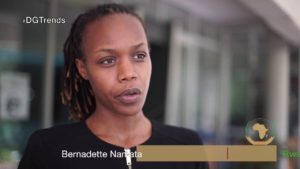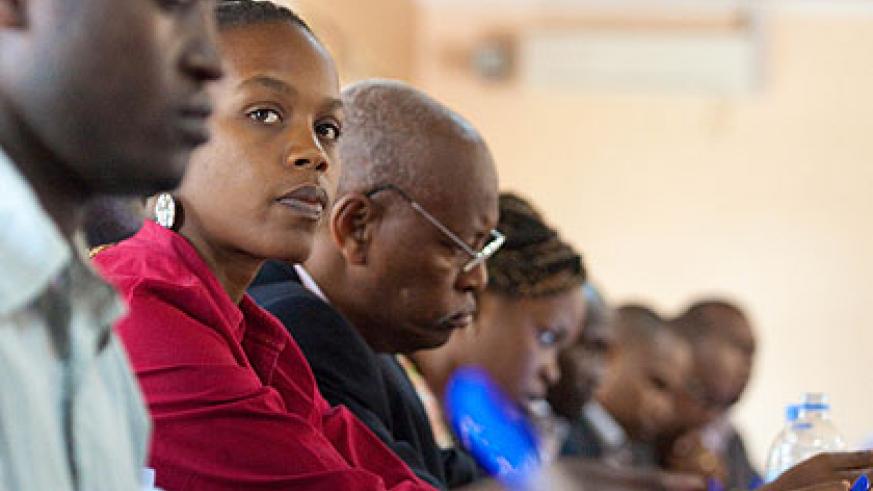Berna Namata has been a business journalist for more than six years, mostly in Rwanda. She spent a year in London as a Chevening scholar. She returned in 2017 and currently works in Rwanda for the Nation Media Group’s popular regional weekly newspaper, The East African.
In this guest blog for the Foreign Office, she reflects on the financial challenges to growing a robust media sector in Rwanda – and says that show-biz coverage shouldn’t be its only future.
The media sector in Rwanda has benefited from a great deal of goodwill from government. There’s been a series of favourable policy decisions. They include setting up a self-regulatory body (the Rwanda Media Commission, set up in September 2013) and most recently the decriminalising of defamation.
Challenges remain
But challenges to the media sector remain. Too often, talented journalists in this part of the world live hand to mouth. When I was in the UK three years ago, I watched countless times as UK public officials including the prime minister were grilled by journalists. What really struck me was the amount of respect officials in the UK have for journalists. Perhaps that’s because most British journalists are not only well educated but also well paid. That’s not the case here.
I think that the biggest challenge for Rwandan media is relevancy. By that I mean getting to grips with day-to-day issues that really interest local audiences. At the moment, the mainstream media in Rwanda is dominated by fluff-stuff: show-biz, celebrity gossip, coverage of beauty contests and cat fights between Rwandan musicians.
Under-reported stories
But ordinary Rwandans also care deeply about their tax bills and how their money is being spent. For example, they want to know whether their Mutuelle health insurance contributions are being collected and remitted to the RSSB (Rwanda Social Security Board). And, as everywhere in the world, Rwandans care about reforms in education. Rwanda embarked on curriculum reform at the beginning of the year. Audiences want to know if the reforms benefit their children? These are all under-reported stories. If journalists in Rwanda want to win public support, I think they have to tackle these issues.
The airwaves in Rwanda are still dominated by entertainment. In my view, there’s not enough of the critical debate and discussions that are so needed for Rwanda to achieve its ambition of a knowledge based economy by 2050. And there’s a proliferation of online media outlets that operate without any editorial policy or professional journalists. Some engage in propagating misinformation. As such, they remain a threat to mainstream media which follows a strict code of ethics. Many Rwandans still turn to foreign media for news analysis and insightful content about Rwanda.
Gap for journalists to fill
 There’s a clear gap for us Rwandan journalists to fill. The onus lies with us to aspire to do better in our work. We have to demonstrate independence and critical insights to be effective in our work in a way that promotes accountability and the long-term survival of our sector.
There’s a clear gap for us Rwandan journalists to fill. The onus lies with us to aspire to do better in our work. We have to demonstrate independence and critical insights to be effective in our work in a way that promotes accountability and the long-term survival of our sector.
I do not think the end goal for any journalist should be better pay. Journalists should aspire to make difference in their society by telling compelling stories. But I also strongly believe that if newsrooms and media houses assert their relevancy by producing compelling content, it indirectly influences a strong following that can be monetised. This, in turn, will lead to better support for newsrooms and journalists.
The UK and Canadian governments are working together to defend media freedom and improve the safety of journalists who report across the world. Jeremy Hunt, the UK Foreign Secretary and Chrystia Freeland, Canadian Minister of Foreign Affairs, will co-host the Global Conference for Media Freedom in London on 10 and 11 July 2019.

 There’s a clear gap for us Rwandan journalists to fill. The onus lies with us to aspire to do better in our work. We have to demonstrate independence and critical insights to be effective in our work in a way that promotes accountability and the long-term survival of our sector.
There’s a clear gap for us Rwandan journalists to fill. The onus lies with us to aspire to do better in our work. We have to demonstrate independence and critical insights to be effective in our work in a way that promotes accountability and the long-term survival of our sector.
This is true, I agree with you that our media lacks relevancy and as such audience. I will just add that:
1. No journalist should consider huge salary as the mark for media development. Nonetheless, in no way should any accept that journalists be the people who cannot afford a meal a day later on be unable to develop as individuals in their lives and profession. To date, it so seems that promotion in media is being able to secure a PR job in an institution, that we need to battle. I have said this before but just to reiterate, we need to find legitimate media and support them to become dynamic just like we have done for all other crucial sectors of the country. Unless we don’t think it is important.
2. We need to raise the bar for qualifications for journalists. We can’t just have anyone take to the waves which is why there is almost no overall ambition within our media towards values sacred to journalism as well as the simplicity with which they can be influenced. At least by now we have trained people, we need to make the sector attractive and professional.
But indeed, we must grow our relevance and yes, we must continue pursuit of excellence.
Thanks for penning this.
Well, Namata is a witness as she seems to have been in the trade here in Reanda for a while. Media being relevant in Rwànda is uphill task and can not just be seen in isolation of other things… More importantly, culture that adopts a consensus without a debate is such a huge constraint.. other things being equal this is a major constraint… Single story line, a collective view as opposed to different views taking the best out of each.. The law as opposed to choice as the president once remarked. Where is the truth in the media???
Thanks Berna Namata for the well detailed challenges faced by Rwandan media.
On my side I will say that lucky are those that even find where to exercise there skills in the foreign media. There are cases where even those that are not yet experts in the field that starts to be threatened because of telling exactly what is on ground and some deny what they have said once the content is published.
How do you expect such a journalist to report reality on the next page of the paper.
There is a lot to change otherwise many will quite.
I concur with Mrs Namata on her description of the Rwandan Media landscape, she makes an accurate analysis about the media coverage propensity for entertainment rather than national issues which doesn’t reflect the aspirations of the public, so we shift for foreign media coverage of Rwanda, which i have to confessed that many of us found more insightful.
so i think the elephant in the room for Rwanda mainstream media is relevancy
i concur with this description made by Mrs Namata which is really an accurate picture of the state of the media in Rwanda, she points out the big issue the Rwandan journalists needs to tackle which is being relevant.